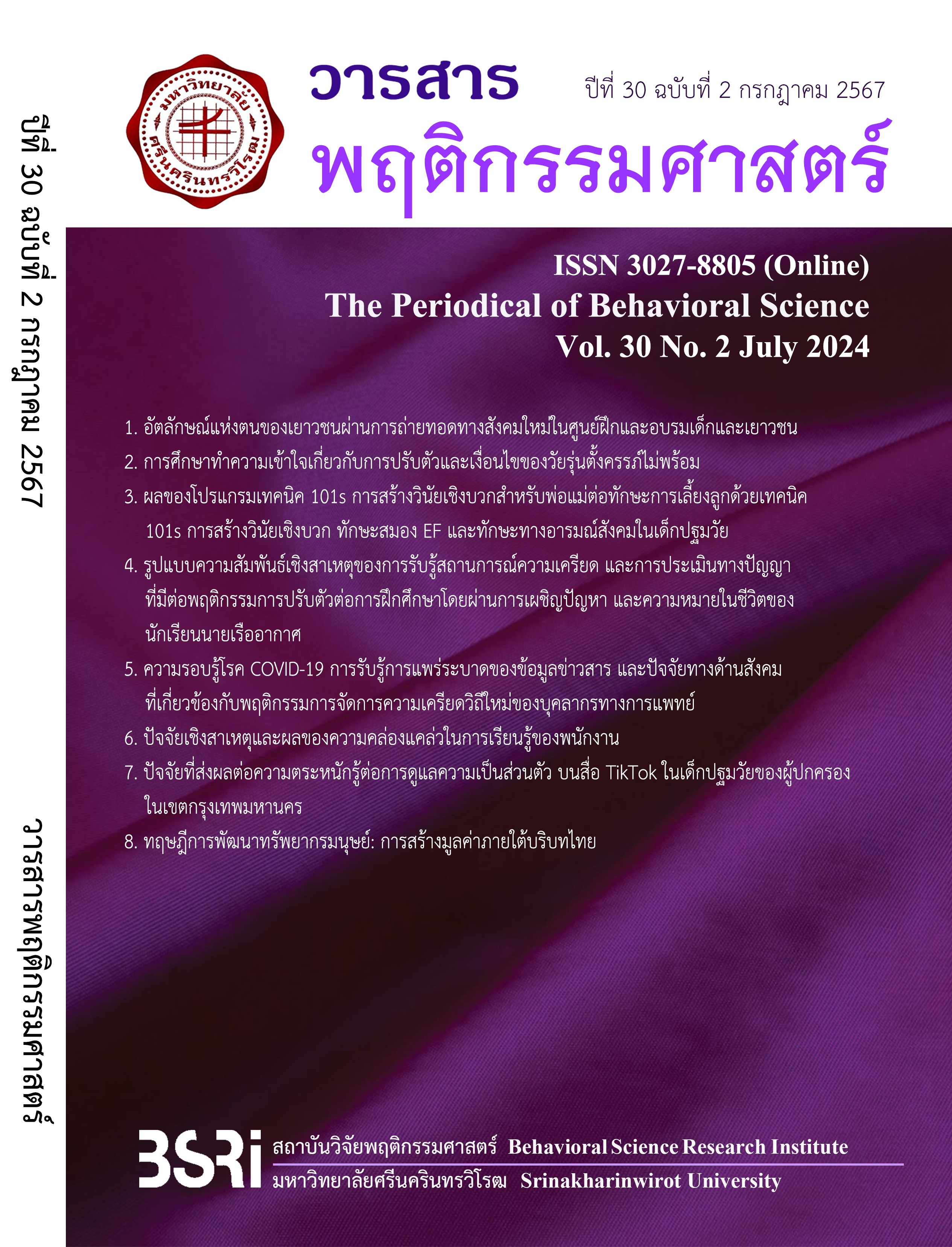The Impact of the 101s Positive Discipline Techniques for Parents on 101s Parenting Practices, Executive Function and Social – Emotional Skills in Preschoolers
Keywords:
The 101s positive discipline technique, positive parenting practice, executive function skills, social-emotional skillsAbstract
Previous research in Thailand in the impact of the 101s Positive Discipline (The 101s) program has showed positive impacts on parenting practices and children’s executive function (EF) skills. While parents needed the most to enhance their parenting skills during the quarantine period of the Covid epidemic, they could not attend on-site training program. Therefore, the 101s program for training parents both on-site and online was developed. This study aimed to examine the impact of the 101s on-site and online program on 101s parenting practice, EF skills and social - emotional skills in preschoolers. The quasi-experimental research with one group pretest and posttest was designed. The sample was 19 parents and 19 preschoolers at National Institute of Child Health. The parent sample attended one on - site session of the 101s program, 4 E-Learning sessions and 7 online group discussions. The instruments included the 101s Parent Interaction Checklist, the 101s Social- Emotional Skills Checklist and MU.EF-101. The data was analyzed using descriptive and inferential statistics including Wilcoxon Matched Pairs Signed Rank Test and Dependent Sample t-test. The results showed that when comparing to the pretest, parents significant had higher posttest - mean scores on 101s parenting practices and the preschoolers significantly had higher posttest - mean scores on EF and social– emotional skills (p < 0.05). The findings suggested that educators and organizations working with children and family could use the 101s online - training program as an alternative for promoting positive parenting skills in parents during quarantine period and in countryside.
Downloads
References
Casel. (2016). Choosing and Using SEL Competency Assessments. California: RAND Corporation. https://measuringsel.casel.org/pdf/Choosing-and-Using-SEL-Competency-Assessments_What-Schools-and-Districts-Need-to-Know.pdf
Chitayasothorn, D. (2009). Diana Baumrind’s Parenting Styles. University of the Thai Chamber of Commerce Journal, 29(4), 173-187. https://utcc2.utcc.ac.th/utccjournal/journal_book.php?journal_id=19 [in Thai]
Chonchaiya, W. (2018). Executive Function. In S. Sutchritpongsa, R. Roongpraiwan, T. Hansakunachai, B. Benjasuwantep, A. Fuangfoo, J.
Chuthapisith, & P. Rojmahamontkol (Eds.), Child development and behavior volume 4 (pp. 19-41). Thai society for pediatric child development. [in Thai]
Chutabhakdikul, N. (2017). Training Program of Nursing Specialty in Child and Adolescent Psychiatric Nursing. https://th.rajanukul.go.th/_admin/file-download/20-6116-1498452993.pdf [in Thai]
Chutabhakdikul, N., Thanasetkorn, P., Lertawasdatrakul, O., & Ruksee, N. (2017). Tool Development and Evaluation Criteria for Assessment of Executive Function in Early Childhood. http://164.115.27.97/digital/files/original/a7274054cbe3c772e275a33beaed5186.pdf [in Thai]
Jinnatanapong, D., Chumchua, V., Chutabhakdikul, N., & Thanasetkorn, P. (2015). The impact of the 101s storybook intervention program on executive function, the 101s social-emotional skills, and school achievement in preschoolers. Proceedings: The Asian Conference on Psychology and Behavioral Sciences 2015. Osaka. [in Thai]
Kotchabhakdi, N. (2018). Parenting guidelines for children 0-5 years old. https://www.unicef.org/thailand/media/2066/file/Parenting%20guidelines%20for%20children%200-5%20years%20old.pdf [in Thai]
Masterson, M. L., & Kersey, K. C. (2013). Connecting children to kindness: Encouraging a culture of empathy. Childhood Education, 89(4), 211-216. https://doi.org/10.1080/00094056.2013.815549
Sutipan, P., Chumchua, V., Chutabhakdikul N., & Thanasetkorn, P. (2012). The impact of the 101s positive discipline teacher training on teacher practices and preschoolers’ executive function skills. Proceedings: The 1st ASEAN Plus Three Graduate Research Congress 2012. Chiang Mai University. [in Thai]
Thanasetkorn, P. (2009). The impact of the 101S: A Guide to Positive Discipline Parent Training: A case study of kindergarteners and their parents in Bangkok, Thailand [Doctoral dissertation]. Old Dominion University, United States of America. https://digitalcommons.odu.edu/earlychildhood_etds/7 [in Thai]
Thanasetkorn, P. (2009). The impact of the 101S: A Guide to Positive Discipline teacher training on teacher interactions practices, teacher-child relationship quality, school adjustment, and academic outcomes in kindergarten classrooms in Bangkok, Thailand [Doctoral dissertation]. Old Dominion University, United States of America. https://digitalcommons.odu.edu/earlychildhood_etds/6 [in Thai]
Thanasetkorn, P., Chumchua, V., Suttho, J., & Chutabhakdikul, N. (2015). The preliminary research study on the impact of the 101s: A Guide to Positive Discipline Parent Training on parenting practices and preschooler’s executive function. Asia-Pacific Journal of Research in Early Childhood Education, 9(1), 65-89. https://www.pecerajournal.com/detail/67438 [in Thai]
Themkumkwun, P., Chutabhakdikul, N., Ruksi, N., & Thanasetkorn, P. (2017). The 101s Storybooks Intervention Program to Promote Executive Function Development in Preschool: The Case Study in Thailand. 11th International Technology, Education and Development Conference (pp. 4179 - 4187). Spain. [in Thai]
UNICEF Thailand and National Statistical Office of Thailand. (2016). Thailand MICS - Monitoring the situation of children and women 2015-2016. https://www.unicef.org/thailand/reports/thailand-mics-monitoring-situation-children-and-women-2015-2016
White, L., Delanney, R., Pacifici, C., Nelson, C., Dickinson, S. L., & Arroyo, L. G. (2019). Understanding and parenting children's noncompliant behavior: The efficacy of an online training workshop for resource parents. Children and Youth Services Review, 99, 246–256. https://doi.org/10.1016/j.childyouth.2019.01.045
Wisconsin Department of Children and Families. (2017). Social and emotional development. Wisconsin Child Care Information Center. https://dpi.wi.gov/sites/default/files/imce/standards/New%20pdfs/dpl-wmels-5-web.pdf
World Economic Forum. (2016). New Vision for Education: Fostering Social and Emotional Learning through Technology. The World Economic Forum. http://www3.weforum.org/docs/WEF_New_Vision_for_Education.pdf
Downloads
Published
How to Cite
Issue
Section
License
Copyright (c) 2024 The Periodical of Behavioral Science

This work is licensed under a Creative Commons Attribution-NonCommercial-NoDerivatives 4.0 International License.
Behavioral Science Research Institute, SWU
114 Sukhumvit 23, Bangkok 10110, Thailand.
Tel.02-649-5000 # 17600



